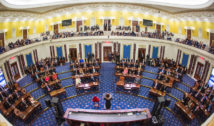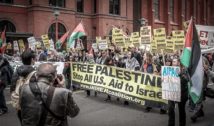
Myanmar: Rohingya Minority May Suffer Concentration Camps
- By Krista R. Burdine --
- 26 Aug 2014 --

The situation in Myanmar worsens, and politicians are having trouble even speaking of the Rohingya victims who may be forced into concentration camps.
Ostensibly as a result of the amount of violence that continually erupts during discussions of what to do about the Rohingya minority living in Myanmar, the government has strongly discouraged foreign officials from any mention of the group by its self-chosen name for the Muslim minority. This effectively represses news from spreading about the situation of this people group who have no citizenship, with many currently living in squalid refugee camps without access to basic human needs such as water, food, and shelter and sanitation.
The Rohingya are a group of people who practice Islam and are named after the Indo-European language they speak.
Most recently, the situations facing the Rohingya have only worsened. Than Tun is a member of Myanmar’s Emergency Coordination Committee and a Buddhist leader in the state of Arakan will be proposing a plan that will imprison the Rohingya in concentration camps. The nation regards the group, including the newborn children, as illegal immigrants, and the proposal is a citizenship verification process designed to detain the minorities indefinitely.
About two years ago, the primarily Buddhist natives of Myanmar began to push 1.3 million Rohingya Muslims from their homes throughout the country, and consolidate them into the country’s western state of Rakhine. About one in 10 of them live in camps without clean water or other aid while the rest are effectively trapped in small towns without fresh water or access to food supplies and cut off from national services such as health care and education. This only worsens the situation in what was already the poorest part of the country with almost 25% child malnutrition rates before the push began.
Although the Burmese government recognizes 135 minority groups living within the country, the Rohingya group is not formally considered one of them because they were originally a group of illegal immigrants from Bangladesh. Now after decades of simmering hostility, a mob mentality seems to have seized the nation to drive out the group and exterminate them.
The UN generally advocates human rights around the globe, and the Rohingya group seems a prime candidate for protection. Instead, the UN appears to be stepping gingerly in formal appearances, so as not to offend the government. Likewise, the US government has spoken affirmatively of the rights of the Rohingya in the past, with President Obama urging university students to care for the dignity of this group as innocent people instead of visiting violence upon them. But that was two years ago, before the current repression became so terrible.
So how can the UN and the US bring aid to the Rohingya now? They don’t appear to be working very effectively as they are abiding by the restriction on even mentioning the group by name. In his recent visit, John Kerry managed to avoid mention of the group by name, although he did discuss the situation in the Rakhine province. Unfortunately, this in a way affords the Burmese government victory in its quest to minimize the group before a global audience.
But no doubt this is to avoid inflaming a difficult situation. The official practice of the US is to avoid using descriptive terms that would offend either side. To be fair, US representatives working with the government there also avoided referring to the group as “Bengali,” the government’s preferred name for them. It seems likely that the delicacy of the situation calls for proceeding with care, so that human rights advocates are given the greatest opportunity to bring aid when the door finally opens to do so.
Unfortunately, diplomacy often proceeds with painful slowness under excruciating circumstances. To those who advocate for and support US foreign aid to victims of religious oppression, the current state of US involvement in supporting this people group seems weak and utterly inadequate. Playing a petty name game set by a government on the edge of committing genocide appears more like support for the oppressor than careful diplomacy
Regardless of their name, a group defined by their religion as much as race endures severe oppression in the westernmost state of Myanmar. As human beings, they deserve to partake in basic human rights just as much as any other person on the planet. In the words of President Barack Obama, “The Rohingya hold within themselves the same dignity as you do, and I do.”



















1 comment
Arafat Ali">Krista R. Burdine
2:17 pmthis is not an issue of HR from the West !!